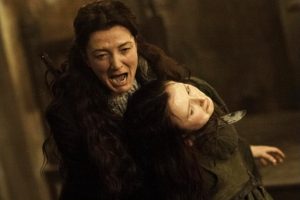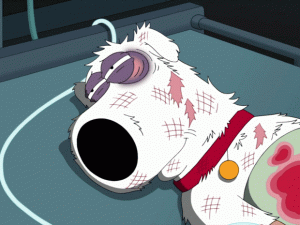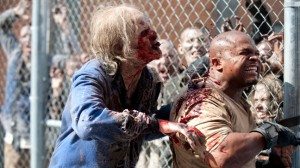
**ATTENTION** The following article contains major spoilers for, well, pretty much every TV show of the past ten years. Proceed at your own caution.
 This past weekend, "The Good Wife" joined the ranks of shows that killed off a major character with little to no warning. The television body count has risen exponentially in the past several years, and a normally subdued legal drama getting in on the shocking-death-game shows just how commonplace this practice has become.
This past weekend, "The Good Wife" joined the ranks of shows that killed off a major character with little to no warning. The television body count has risen exponentially in the past several years, and a normally subdued legal drama getting in on the shocking-death-game shows just how commonplace this practice has become.
Not so long ago, it used to be that you could sit through an entire season of television without worrying about the fate of your favorite fictional characters. These days, it seems like barely a week goes by without a series regular somewhere meeting the grim reaper. Just check out this list of TV shows that featured at least one demise of an integral character in 2013 alone (and in many cases, several demises): "American Horror Story", "The Americans", "Army Wives", "Awkward", "Bates Motel", "The Big C", "Boardwalk Empire", "Breaking Bad", "Dallas", "Dexter", "Downton Abbey", "Fringe", "Game Of Thrones", "Glee", "Grey's Anatomy", "Homeland", "House Of Cards", "Nashville", "Orange Is The New Black", "Orphan Black", "Person Of Interest", "Ravenswood", "Revenge", "Scandal", "Sons Of Anarchy", "Supernatural", "Teen Wolf", "True Blood", "The Vampire Diaries", "Vikings", "The Walking Dead". Phew! (Forgive me if I missed some, it's very hard to keep track when the bodies are piling up so fast.)
To be clear, death has existed on television since the invention of the medium. But it's impossible to argue the fact that we're in the midst of an unprecedented bloodbath. What sparked this trend of writers so gleefully offing their own creations? Who started it? And when will we reach the critical point where major deaths no longer mean anything? ...Or have we gotten there already?
You don't have to look very far to find the most famous modern example of murderous television mayhem. A willingness to say goodbye to major players is essentially the trademark of HBO's fantasy series "Game Of Thrones", ever since Eddard Stark (Sean Bean) quite literally got the axe back in Season One. Heck, the third season culminated in not one, not two, but three major characters all getting knifed in one single scene. And we're not talking major villains, either. We're talking about three of the show's dwindling ranks of protagonists. Granted, the writers of "Thrones", David Benioff & D.B. Weiss, can't take the credit for these deaths since their show is based on a series of novels by author George R.R. Martin -- but it's clear that the success of their show has inspired a similar wave of callous disregard for life amongst its television brethren.
 The most recent season of "Thrones" had an average gross audience of 14.2 million viewers, making it the second most-watched program in HBO's history, after only their flagship gangster show, "The Sopranos" (which was barely ahead in its fifth season with 14.4 million). The show has also racked up both critical acclaim and awards nominations, as well as earning the distinction of being the single most pirated program on the air in both 2012 and 2013. If other television writers want to cash in on that success, who can blame them? And what easier way to emulate the buzzy, made-for-Twitter formula of "Thrones" than to start slicing and dicing their way through their own casts?
The most recent season of "Thrones" had an average gross audience of 14.2 million viewers, making it the second most-watched program in HBO's history, after only their flagship gangster show, "The Sopranos" (which was barely ahead in its fifth season with 14.4 million). The show has also racked up both critical acclaim and awards nominations, as well as earning the distinction of being the single most pirated program on the air in both 2012 and 2013. If other television writers want to cash in on that success, who can blame them? And what easier way to emulate the buzzy, made-for-Twitter formula of "Thrones" than to start slicing and dicing their way through their own casts?
But while "Game Of Thrones" may have set the modern precedent, we can trace the trend back a bit further to a pair of shows that dared to get rid of audience favorites, and didn't have these deaths based in pre-existing material. When "Lost" premiered on ABC in 2004, it became instantly recognizable for its complex mysteries, lush location shoots, and diverse ensemble cast. But by the end of its first season, it was famous for something else as well: pruning that large ensemble cast by killing at least one series regular, if not several, every season. Boone. Shannon. Ana Lucia. Libby. Eko. Charlie. Michael. Charlotte. Daniel. Locke. Juliet. Sayid. Sun. Jin. Jack. Fifteen series regulars met their maker in six seasons of television. But mortal danger was woven into the fabric of that sci-fi show from the start -- perhaps an even better example is another drama that also premiered on ABC that same year.
"Grey's Anatomy" is a much more realistic show than "Lost", dealing primarily with the lives and loves of a group of interns and doctors at a teaching hospital in Seattle. And yet, strangely, "Grey's" has a body count almost as high as "Lost". Obviously, being a medical show, guest stars will be dying of strange diseases pretty much every week, but it often seems like the doctors are in as much danger as the sick and injured people they're treating. In a running joke, the hospital is now affectionately nicknamed "Seattle Grace Mercy Death"; doctors have been electrocuted, hit by buses, shot, and even died in plane crashes. That's quite a high morbidity rate for a sudsy primetime network medical soap. "Grey's" creator Shonda Rimes is responsible for making it not just acceptable, but chic for network shows where rampant deaths would previously have been out of place to start culling the herds of their large casts. These unexpected deaths are pumped for juicy drama and even juicier ratings.
 The pinnacle of this new trend was reached late last year when "Family Guy", an animated sitcom not known for its body count, killed off one of its main characters, Brian the dog, by running him over with a car. What initially seemed like a daring (if bizarre) creative decision was undermined mere weeks later when the writers brought the character back to life via time machine, proving that the stunt was nothing more than a mere grab for ratings and relevance. The third installment of FX's anthology series "American Horror Story" followed suit this year, murdering -- and immediately resurrecting -- countless characters with reckless abandon. In the four short years since "Lost" went off the air (with every single one of its characters dead, no less), we've seen a distressing transition. Deaths used to be employed sporadically but effectively to make the viewer feel like no character was safe, no matter how important they seemed. These days, major deaths are occurring on some shows with such frequency that we've stopped growing attached to characters altogether, since we know it's only a matter of time before they're killed off. Do you even remember the names of Sam's shapeshifter girlfriend or Eric's vampire sister, both of whom died last season on "True Blood"?
The pinnacle of this new trend was reached late last year when "Family Guy", an animated sitcom not known for its body count, killed off one of its main characters, Brian the dog, by running him over with a car. What initially seemed like a daring (if bizarre) creative decision was undermined mere weeks later when the writers brought the character back to life via time machine, proving that the stunt was nothing more than a mere grab for ratings and relevance. The third installment of FX's anthology series "American Horror Story" followed suit this year, murdering -- and immediately resurrecting -- countless characters with reckless abandon. In the four short years since "Lost" went off the air (with every single one of its characters dead, no less), we've seen a distressing transition. Deaths used to be employed sporadically but effectively to make the viewer feel like no character was safe, no matter how important they seemed. These days, major deaths are occurring on some shows with such frequency that we've stopped growing attached to characters altogether, since we know it's only a matter of time before they're killed off. Do you even remember the names of Sam's shapeshifter girlfriend or Eric's vampire sister, both of whom died last season on "True Blood"?
Another prime example: AMC's "The Walking Dead". The show, now in its fourth season, has the biggest audience in the history of cable television...and yet, how many of those people are watching for intricate character development, and how many are watching to see zombie brains splatter all over the screen? I have a hunch the majority of viewers fall into the latter camp. Every new character introduced on "The Walking Dead" is given one characteristic (cowboy hat, crossbow, katana, dead daughter, bushy beard, giant mustache) that becomes that person's defining aspect -- and then that person kills zombies every week until one day they die. Granted, like "Game Of Thrones", "The Walking Dead" has many of its deaths based in its source material and, like "Lost", an atmosphere of mortal danger is inherent to the premise of the show. But the writers of the show seem so committed to the act of killing that they're afraid to spend too much time actually building complex characters that we might grow to love. Because if we love someone too much and they die, we might stop watching. (It's the reason fan-favorite Daryl Dixon is probably the only character who can remotely be considered "safe." We'll reopen this conversation later if they ever do decide to kill him off.)
Obviously, there are varying reasons showrunners might decide to send a character into the television graveyard, and a ploy for ratings is just one. Deaths can also be creative decisions, they might occur due to commitment to source material, or because an actor wants to leave a show, or (most tragically) because an actor has passed away. "Glee" and "Dallas" both had to contend with the latter case this past year, as both Cory Monteith and Larry Hagman died mid-series. The recent death on "The Good Wife" falls into the category of an actor wanting out of his contract: original cast member Josh Charles decided it was time for him to move on, and the showrunners had to figure out a way to write him off the show. There are a myriad of ways they could have approached this, including having him relocate to from Chicago to New York (his law firm is in the process of opening a branch there) or sending him to prison (he was about to be indicted for helping the Governor cover up election fraud). But a sudden, out-of-the-blue death is what they opted for. Was this a purely creative decision reached to help rejuvenate their show? Or was it simply a way to make the most out of a tough situation by grabbing some headlines? We'll find out in the way they choose to deal with the aftermath throughout the rest of the season. (For my money, I'm betting on the former.)
 "Downton Abbey" had to deal with this same situation when star Dan Stevens (who played Matthew Crawley) decided to call it quits. In his case, he only announced his departure with one episode left in the season, so the writers had no time to craft a believable exit. Matthew and Lady Mary were madly in love, and there was no way they could come up with a reason for him to leave her in only one episode, so their hand was forced into an awkward, shoehorned-in death scene. Lest we remain too cynical, let's remember those deaths that occurred through creative decisions, like Rita on "Dexter" or Jimmy on "Boardwalk Empire". Those deaths both shocked viewers and helped break their respective shows out of creative ruts. But for every Rita, there's a T-Dog, who did absolutely nothing through three seasons of "The Walking Dead" before finally getting his throat ripped out, effectively contributing nothing to the show in either life or death.
"Downton Abbey" had to deal with this same situation when star Dan Stevens (who played Matthew Crawley) decided to call it quits. In his case, he only announced his departure with one episode left in the season, so the writers had no time to craft a believable exit. Matthew and Lady Mary were madly in love, and there was no way they could come up with a reason for him to leave her in only one episode, so their hand was forced into an awkward, shoehorned-in death scene. Lest we remain too cynical, let's remember those deaths that occurred through creative decisions, like Rita on "Dexter" or Jimmy on "Boardwalk Empire". Those deaths both shocked viewers and helped break their respective shows out of creative ruts. But for every Rita, there's a T-Dog, who did absolutely nothing through three seasons of "The Walking Dead" before finally getting his throat ripped out, effectively contributing nothing to the show in either life or death.
In horror films, there's a much-maligned trope called "jump scares." This is when a character or object appears out of nowhere, usually accompanied by a loud noise, making the audience jump out of their seats. This serves to frighten the viewer without having to actually build suspense. Deaths of series regulars on television are in danger of becoming the new "jump scare": a cheap trick used to jolt an audience and amass tweets without actually putting in the time and effort to slowly build compelling characters and craft intricate stories.
It should say something that the most widely acclaimed new show of this year also contained what many viewers agreed was an anticlimactic ending. HBO's "True Detective" subverted the morbid expectations of our current television-watching culture by ending its first season with both of its main characters still breathing. Many viewers saw this as a letdown, complaining that the writers took the easy way out and tacked on a happy ending to an otherwise heavy show. But why would the writers of an anthology series have to worry about killing their characters, when none of those characters will be back for a second season anyway? If they had felt it appropriate for their story for one or both of them to die, they would have done it. I would argue that it was a much bolder decision to not kill either Cohle or Hart, and leave both men alive to face the demons they're undoubtedly saddled with after their horrifying ordeal. But thanks to the over-saturation of "shocking" deaths on television, the bloodthirsty masses felt perversely robbed, as though by sitting through an entire season, they were entitled to see at least one major character bite the dust.
Robert & Michelle King, the executive producers of "The Good Wife" penned an open letter to their fans after the shocking events of last Sunday's episode. Here's one notable passage:
Death also created a new dramatic “hub” for the show. We’re always looking for these turning points—some event midway through the season that will spin everybody’s lives in new directions. These turning points keep the show from slipping into a numbing sameness, and keep the characters fresh: because you see how they react to a completely new status quo. Will’s death in many ways becomes a hub for the whole series, violently spinning everybody in new directions.
The legal drama has already been garnering raves this year for being better than ever in its fifth season on the air. Hopefully the decision to suddenly kill off a major character will in fact serve as a "dramatic hub" for the show, and help to inspire even more thrilling plots. If the Kings live up to the promise stated in their letter, maybe "The Good Wife" will spawn a new trend: one of writers using death as a means to actively engage their viewers in meaningful stories. Or, put simply: "grief as catalyst" rather than "death as gimmick."
What do you think? Are you getting tired of TV deaths, or do they still shock you? What major character's death in the past year affected you the most, and why? Is it only a matter of time before the cast of "The Big Bang Theory" starts dropping like flies? Tweet us @Stagebuddy to share your thoughts!